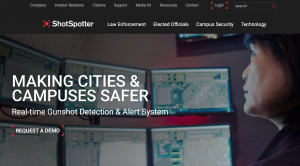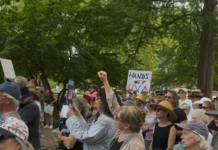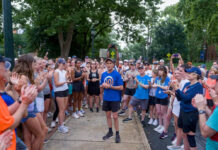UVa students might know Jennifer Doleac best in her role as an Assistant Professor of Public Policy and Economics at the Batten School, but what they might not know is that Doleac is also the Founding Director of the Justice Tech Lab, a research organization dedicated to finding effective solutions to criminal justice problems.
The relatively recent creation of this lab is the latest substantial development in Doleac’s long-time studies of criminal activity’s relationship to American public policy. For Doleac, the projects coming out of this lab represent the extension of her past studies and efforts.
“A lot of my work, and a lot of my research is on the impacts of technology on the criminal justice system,” Doleac explained. “Over the past several years, I’ve been working on studying different types of technology and their impacts on crime and criminal behavior.”
Doleac said that many communities struggle to identify which new, developing technologies to utilize when attempting to reduce crime.

“It is increasingly clear that there’s a real hunger for evidence among police departments, and local and state governments, to try to figure out which of these tools are effective,” Doleac told WUVA News. “Technology is increasingly important in all sectors, but the criminal justice system…is dealing with sort of unique challenges, and needs evidence to guide their investment in some tools rather than others.”
And this is exactly where she said her research can help.
“The Justice Tech Lab is focused on evaluating those types of tools, and providing evidence on what the impacts are, so that police departments and policymakers can make good decisions,” she said. “We also use data generated by a lot of these tools that…helps shed light on other sorts of policy problems, and [we’re] also thinking about what the impacts of technology can be on reducing racial disparities in criminal justice outcomes.”
Doleac’s studies have focused on a range of innovations like increasingly-widespread DNA databases; her work on this particular topic was even cited in briefs during the 2013 Supreme Court case Maryland v. King. She said that DNA databases have a deterrent effect on offenses stronger than “our more traditional crime-reduction tool of prison.”
“DNA databases are in use in every state in the U.S., and in many, many countries around the world,” Doleac explained. “Basically, the idea is that when you are depending on local law, when you’re arrested, or charged, or convicted of a crime, you’re required to provide a DNA sample to the government that is used to come up with an identifying profile of you–a string of numbers that goes into this database, and it’s constantly compared against crime scene evidence…increasing the probability that you’ll get caught.”
Doleac said that ShotSpotter, a new technology that uses acoustic sensors to detect sounds of gunfire, record timestamps, and triangulate the precise locations of all gunfire incidents in a covered area, also caught her attention when it came to analyzing incidents of violence.
 “The idea is that [authorities] can get a victim to the hospital sooner, or they can collect evidence at the scene, or they can arrest somebody that’s still there,” she explained. “In the process of that tool being potentially useful to police, it’s also generating a database of all of the gunfire in that area of the city.”
“The idea is that [authorities] can get a victim to the hospital sooner, or they can collect evidence at the scene, or they can arrest somebody that’s still there,” she explained. “In the process of that tool being potentially useful to police, it’s also generating a database of all of the gunfire in that area of the city.”
According to Doleac, that data can be a game changer for interested parties, not only because it delivers information to the police, but also because it provides a stable point of reference for policymakers.
“When you think about studying the impacts of policies on gun violence, it’s usually really hard, because the data is so bad,” she said. “A big challenge in a lot of crime research is that policies can also affect the reporting of crime. What’s really nice about this ShotSpotter data is that there are a lot of policies that we would think would change the reporting of crime…but there’s no reason that they would change the accuracy of the sensors. So the ShotSpotter data should be immune to reporting problems.”
The sensors have already informed Doleac’s research on juvenile curfews in urban areas. She found that curfew laws tend to increase gun violence in cities, contrary to what policymakers previously believed. Going forward, Doleac said she will collaborate with Professor Ben Castleman at the Curry School of Education to study how technology can help to reduce recidivism.
Considering the recent hike in crime in the area surrounding the University, Doleac knows that there is a chance of students becoming interested in assisting her with this research. She said that she welcomes student participation.
“As an economist, I do a lot of work with data, so if you have quantitative skills, or you’re interested in programming skills, or you’re interested in developing those skills–if you want to take a programming class and actually have a place to practice that–I’m especially excited about folks who want to work with data,” Doleac said. “But even if you’re just interested in the issue, I’ll be having a team of people contacting police departments and trying to gather data. So there’s plenty of room across the spectrum, and on a variety of fronts.”
To contact Professor Doleac, send her an email at jld4mr@virginia.edu, or a message on Twitter.
For more information about the Justice Tech Lab, click here.
















